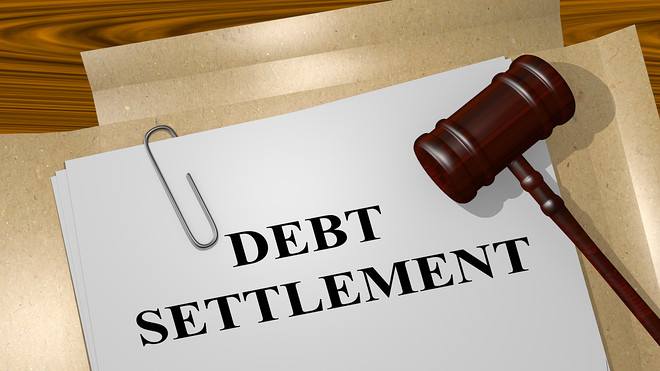A debt settlement strategy is one where you, or a company that acts on your behalf, negotiate with creditors so they accept a lesser amount than you owe. It is the goal to reach an agreement where you pay a lower balance, typically in a lump-sum payment, and the creditor forgives the remainder of the debt.
The process works best for unsecured debts such as credit cards, medical debt, personal loans, and certain types of business debt. Secured debts such as mortgages and auto loans are not suitable for settlement, because creditors can repossess collateral if they don’t get paid.
Debt Settlement: How it Works
Debt settlement usually begins when a person is behind in their payments or if they stop paying to show financial hardship. When creditors believe that they are unlikely to collect the full amount, they will be more willing to negotiate.
You can attempt to negotiate a settlement on your own by getting in touch with your creditors directly. You can take full control of the process by contacting creditors directly. Be prepared to call creditors and explain your financial situation in detail. Propose a settlement amount that is usually between 30% and 60% of the original debt.
You can also hire a company that negotiates on your behalf. The fees charged by these companies range from 15% to 25% of the debt settled. You’ll be instructed to stop paying your creditors and deposit the money in a special savings account until you have enough to make settlement offers.
The Benefits of Debt Relief
Debt settlement can reduce your debt by a significant amount. Successful settlements often involve paying between 40% and 60% of the original amount, which can result in thousands of dollars saved compared to paying all the money plus interest.
If you have high-interest cards, debt settlement is a better option than making minimum payments. Settlement allows you to pay off your debts faster than making minimum payments. This is especially true for high-interest credit cards.
Settlement may be preferable for people who are facing extreme financial hardship. Both options can damage your credit score, but debt settlement lets you avoid the legal process associated with bankruptcy and the public record. You can also choose which debts you want to settle when.
Risks and Considerations
Debt settlement carries serious risks, which you should carefully weigh. Your credit score can be affected by up to 100 points when you stop paying and settle your debts at less than the full amount. These negative marks will typically stay on your credit report for seven years.
It’s not guaranteed that your creditors will settle your debts. You may find that your debts increase as you save money to pay for settlement offers. Some creditors will also take legal action rather than agreeing to settlements.
Companies that settle debts charge significant fees. These fees range from 15% to 25%. The fees can quickly add up when you settle multiple debts. Some disreputable companies also make unrealistic promises or charge up-front fees. Such conduct is against federal law.
Alternatives to Debt Relief
Explore other options before settling your debts. They may be less harmful to your financial situation. Debt consolidation is the process of combining several debts into one loan at a lower rate. This makes payments easier while maintaining your credit score.
Nonprofit organizations often offer credit counseling services. They can assist you in creating a budget and engaging in negotiations with your creditors. These services are usually much cheaper than debt settlement firms and do not require you to stop paying your bills.
Credit counselors offer debt management plans that involve making one payment per month to the agency. The agency then distributes your payments to creditors. These plans include lower interest rates and fees and are generally better for your credit score than settlement.
Do You Need to Settle Your Debt?
People who are in financial difficulty and have few options to repay their debts fully should consider debt settlement. Settlement might be a good option if you are facing financial hardships such as unemployment, medical emergencies, or divorce.
This money can come from savings, family assistance, or money you’ve been setting aside instead of making regular debt payments. You may have money in savings, from family help, or that you’ve set aside to pay off debts instead of paying them regularly. Settlement negotiations will not be successful if you do not have substantial funds.
Only settle if you are prepared to deal with the potential tax implications and damage to your credit score. The credit impact of settlement can be problematic if you plan to apply for a major credit, such as a car loan, mortgage, or mortgage in the near term.
Investing in Your Financial Future
Debt settlement can be a beneficial option for you, but it is important to consider your financial goals and circumstances before deciding. Settlement can reduce debts significantly, but the tax and credit consequences are not suitable for everyone.
Consider negotiating directly with your creditors to avoid paying company fees. Make sure that you are aware of all possible consequences before you stop making payments. Be sure to get any settlement agreements in written form and prepare for the tax implications if you forgive debt.
Debt settlement is only one way to deal with overwhelming debt. Credit counseling, debt management, consolidation loans, and bankruptcy may be better options depending on your circumstances. Consider all of your options, and consult a financial advisor or lawyer who can offer personalized advice.
FAQs
1. How much time does it take to settle debt?
Debt settlement can take 2–4 years, depending on the number of debts you are settling and your ability to save up money quickly for lump-sum payments. Negotiations with creditors may take several months.
2. Will debt settlement stop collection phone calls?
If you fall behind in your payments, debt settlement calls may continue or even increase.
3. Would it be possible to settle my debts without using a business?
You can certainly negotiate directly with your creditors. You can save money by negotiating directly with creditors. Many creditors will work directly with borrowers if they can demonstrate a genuine financial hardship.
4. What happens to my credit rating during debt settlement?
When you stop paying and settle your debts at a lower amount, it is likely that your credit score will drop. Negative effects can last up to seven years. However, if you continue making payments on your other accounts, the impact will diminish over time.
5. Do you have debts that are not repaid?
Some debts can be difficult to settle or even impossible, such as student loans, tax debts that are recent, child support, and alimony. Some creditors also have policies that prevent them from settling certain accounts.




